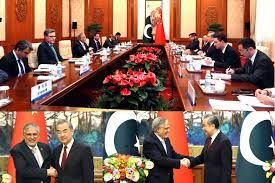Pakistan, China agree for stronger multi-sphere cooperation, accelerate connectivity projects

Beijing: Pakistan and China have agreed to strengthen cooperation in energy, banking and financial sectors and accelerate progress on connectivity projects, besides making joint efforts to support high-quality Belt and Road cooperation and forge an “upgraded version” of the China-Pakistan Economic Corridor (CPEC).
The bilateral ties and cooperation were discussed during the Fifth Round of the Pakistan-China Foreign Ministers’ Strategic Dialogue held in Beijing on Wednesday and co-chaired by Deputy Prime Minister and Minister for Foreign Affairs Senator Mohammad Ishaq Dar and Chinese Foreign Minister Wang Yi.
During the Dialogue, the two sides exchanged views on the entire range of bilateral relations and cooperation, including in strategic, economic, political, defence and security, trade, investment and commerce, and cultural and people-to-people domains. International and regional issues of shared interest were also discussed, according to a joint press release issued following the event. Two sides reached a consensus to collectively take measures to safeguard their common interest, promote the socio-economic development of the people of the two countries, and work together to promote peace, development and prosperity of the region. Pakistan and China agreed to work together to deepen and substantiate China’s eight major steps to support high-quality Belt and Road cooperation, and forge an “upgraded version” of the China-Pakistan Economic Corridor (CPEC) by jointly building a growth corridor, a livelihood-enhancing corridor, an innovation corridor, a green corridor and an open corridor, by aligning them with Pakistan’s development framework and priorities.
Two sides agreed to accelerate progress on major connectivity projects including the upgradation of ML-1, the Gwadar Port, realignment of Karakoram Highway Phase II, strengthen cooperation in agriculture, industrial parks, mining, information technology and other fields according to local conditions, and enhance Pakistan’s capacity for sustainable development. They believe that the Khunjerab Pass played an important role in promoting bilateral trade and people-to-people exchanges, and agreed to speed up efforts to make sure that the Khunjerab Pass can function all year round. The two sides agreed to further strengthen financial and banking cooperation, including through support to each other at regional and international forums. The Pakistani side appreciated China for providing support for its fiscal and financial sectors and assistance in the face of floods and other natural disasters.
Both sides reiterated that Pakistan and China were All-weather Strategic Cooperative Partners sharing an unbreakable ironclad friendship and strategic mutual trust. It was agreed that the two sides would implement the important consensus reached by the leaders of the two countries, enhance exchanges at all levels, deepen experience-sharing in state governance, further enhance win-win cooperation in all areas.. China congratulated Pakistan on holding successful general elections, and expressed good wishes to the new Pakistani government while Pakistan spoke highly of China’s major development achievements in the New Era under the leadership of President Xi Jinping. The Pakistani side reaffirmed its firm commitment to the one-China principle and reiterated support to China on Taiwan Xinjiang, Xizang, Hong Kong and the South China Sea.
The Chinese side reiterated its steadfast support for Pakistan in safeguarding its sovereignty, national independence and territorial integrity, in pursuing a development path suited to Pakistan’s national conditions, firmly combating terrorism, and in playing a bigger role in regional and international affairs. The two sides strongly condemned the terrorist attack on the Chinese convoy of the Dasu Hydropower Project in Pakistan on March 26, 2024, and emphasized that no attempt to undermine China-Pakistan cooperation would ever succeed. It was assured that Pakistan would hunt down the perpetrators and bring them to justice, take more effective security measures, and make all-out efforts to ensure the safety of Chinese personnel, projects and institutions in Pakistan.
The two sides reiterated their commitment to combating terrorism in all its forms and manifestations with a “zero tolerance” attitude and agreed to further strengthen cooperation in counter-terrorism and security through a comprehensive approach. Both sides expressed satisfaction at their expanding space cooperation and agreed to further build on it for a peaceful and mutually beneficial exploration of space. Both sides underscored the importance of maintaining peace and stability in South Asia, the need for resolution of all outstanding disputes, and their opposition to any unilateral action. The Pakistani side briefed the Chinese side on the latest developments of the situation in Jammu and Kashmir. The Chinese side reiterated that the Jammu and Kashmir dispute was left over from history, and should be properly and peacefully resolved in accordance with the UN Charter, relevant UN Security Council resolutions and bilateral agreements. Pakistan commended China’s efforts to safeguard the rights of developing countries for sustainable development.
The two sides reaffirmed their commitment to the purposes and principles of the UN Charter, support for multilateralism and free trade, and opposition to the creation of “small circles” and bloc confrontation. Both countries agreed to strengthen communication and coordination on the Afghanistan issue. They called for concerted efforts of the international community to help Afghanistan properly address challenges in such areas as the humanitarian situation and economic development, and encourage Afghanistan to build an inclusive political framework, adopt moderate policies, pursue good neighborliness, and firmly combat terrorism, including not allowing its territory to be used for terrorist acts.
The two sides reiterated that the fundamental way out of the Palestinian-Israeli conflict was in the two-state solution and the establishment of an independent State of Palestine. They believed that the resolution adopted by the UN Security Council was legally binding, and should be enforced effectively to achieve an unconditional and lasting ceasefire immediately. The international community should increase input into the Palestinian question with a greater sense of urgency, step up efforts to facilitate the early resumption of peace talks between Palestine and Israel, and strive for enduring peace, they emphasised.





